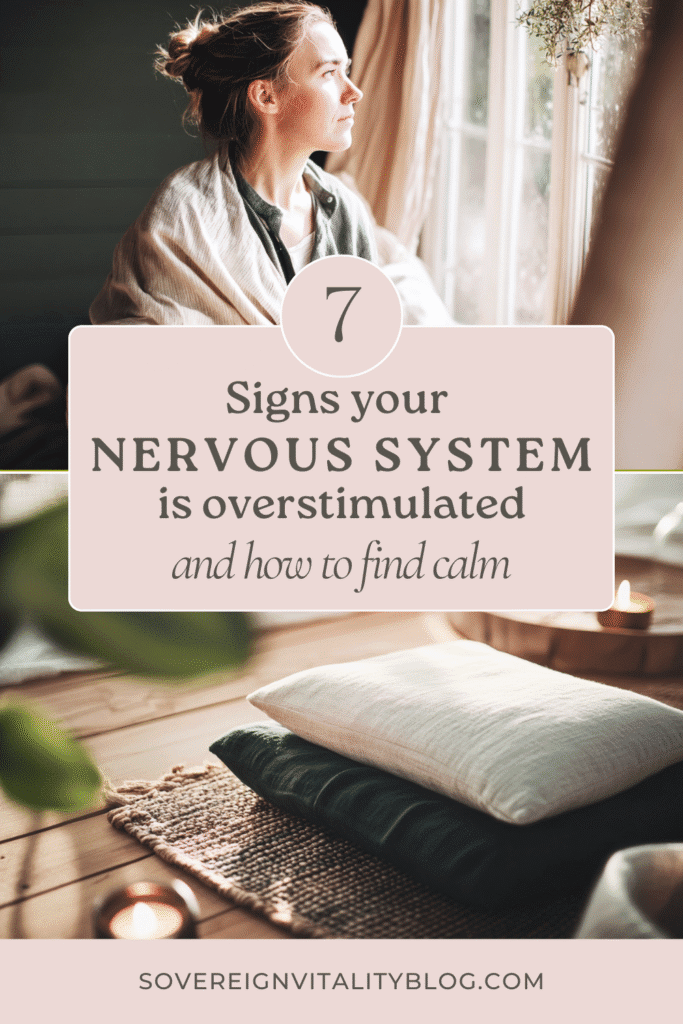This post may contain affiliate links, including those from Amazon Associates. If you make a purchase through these links, I may earn a commission at no additional cost to you. Learn more about our affiliate policy.
Does this sound familiar: You’re not sleeping well. You feel snappy and scattered.
Little things like the dishes piling up in the sink or your phone buzzing yet again feel like too much, and you’re not even sure why.
If you’ve been quietly wondering, “Is something wrong with me?” please hear this:
You’re not broken, and this isn’t your fault. Your nervous system is simply overstimulated, and it’s doing its best to protect you.

I’ve walked this path myself, and I know how confusing it feels to sense something is “off,” without being able to clearly name what’s happening.
This post was created to gently help you recognize the subtle signs of nervous system overstimulation, understand why they’re happening, and most importantly, empower you with simple, compassionate ways to shift back into calm.
What It Means to Be Overstimulated

When your nervous system becomes overstimulated, your body remains stuck in a chronic state of high alert, which is called sympathetic dominance.
It feels like you’re always bracing for impact. This state is triggered by constant stress, relentless sensory input, emotional overwhelm, and the endless scrolling and notifications of digital life.
Even if you don’t consciously feel “stressed,” your body might still be absorbing this invisible tension. It might show up as physical exhaustion, emotional sensitivity, or mental fog.
Please remember this: your body is not failing you. It’s working overtime to keep you safe. It just hasn’t had enough opportunities lately to truly rest.
As you read through these signs, see if they resonate with your own experiences. After each sign, I’ll share a gentle, simple practice I’ve personally found helpful in regulating my own nervous system.
1. You wake up feeling tired, even after sleep

You might feel like: “Why do I still feel exhausted after sleeping for eight hours?”
When your nervous system stays in survival mode, you rarely experience deep, restorative sleep. Your body never fully shifts into a restful state.
Gentle support: One tool I’ve come to trust during overstimulated seasons is Anima Mundi’s Relax Tonic, a calming herbal tincture made with ashwagandha, passionflower, lemon balm, and chamomile.
I keep it near my tea station and often add a dropperful to warm water in the evening or mid-afternoon. It’s not a fix-all, but it’s helped me ease the edge of emotional overwhelm and return to myself more gently.
Explore more natural remedies for getting deep, restful sleep here.
2. Small tasks feel emotionally overwhelming

You might feel like: “Why am I crying over something as simple as dirty dishes or unopened emails?”
When your nervous system is overloaded, small tasks feel daunting and emotionally charged. You’re not being dramatic, you’re overwhelmed.
Gentle support: Set tiny micro-goals (like washing one cup or replying to just one email) and pair them with grounding rituals like feeling your feet on the floor or holding your own hand gently as reassurance.
3. You’re easily irritated by sound, light, or clutter
You might feel like: “Why is everything bothering me today—the bright lights, the TV noise, the messy room?”
Sensory overload happens when your nervous system struggles to filter input because it’s already overstretched. Everyday sensory stimuli feel louder and harsher than usual.
Gentle support: Create small pockets of quiet during your day, even just five minutes of silence. Reduce visual and auditory stimulation where possible. Turn off background TV, dim lights, or declutter a single surface.
4. You can’t stop scrolling, but you feel worse after

You might feel like: “Why can’t I stop scrolling Instagram, even though it makes me feel anxious and empty?”
Compulsive scrolling briefly numbs your nervous system but ultimately hijacks your dopamine and further dysregulates your emotional state.
Gentle support: Try a single scroll-free morning or evening each week. Just 20–30 minutes without your phone can reset your nervous system and offer genuine relief.
Explore more ideas in the 7-Day Digital Detox Plan That Calms Your Nervous System.
5. You’re emotionally reactive or on edge
You might feel like: “Why am I snapping at people or crying so easily?”
This emotional reactivity happens when your sympathetic nervous system is constantly activated—putting you in a fight-or-flight state.
Gentle support: Activate your vagus nerve through humming softly, splashing cold water on your face, or taking several long, slow exhales. Even brief vagal stimulation gently signals safety to your body.
6. You zone out, forget what you were doing, or feel numb
You might feel like: “Why am I spacing out so much? Why can’t I remember simple things?”
This numbing or mental fog is called dorsal vagal shutdown, which is a protective mechanism that kicks in after prolonged stress and overwhelm.
Gentle support: Slowly orient yourself back into the present. Touch something natural like a plant, a stone or feel the texture of your clothes. Remind your body gently that you’re safe and present.
7. You feel like no one gets how hard it is right now

You might feel like: “Nobody seems to understand how overwhelming everything feels to me right now. Am I just lazy?”
Feeling isolated or misunderstood is common with nervous system dysregulation. It often carries shame and guilt, making you question yourself even more.
Gentle support: First, validate yourself. You’re not lazy; you’re surviving. You are not alone in this feeling. You’re navigating something real and challenging.
What to Do If You Recognize These Signs
Simply recognizing these signs within yourself is a powerful first step toward healing your nervous system. Here are three gentle, practical actions you can try right now to begin soothing your overstimulated system:
- 5-Minute Anchor: Take five minutes right now to breathe deeply, gently hold your own hand, or light a calming candle. Small actions matter deeply.
- Screen-Free Pause: Set aside even a brief screen-free window (morning, evening, or lunch break). Allow your nervous system a moment of quiet.
- Supportive Swap: Make one simple, supportive swap in your environment—soft lighting, calming scents, or quieter sounds.
If you’re feeling ready to gently go deeper, consider exploring my guide on How to Rewire Your Nervous System for Calm With a 30-Day Routine. It offers structured yet gentle practices for creating deeper and lasting calm.
You’re Not Failing, You’re Just Fried
As you reflect on these signs, please remember this:
The modern world often asks too much of us. Your nervous system isn’t asking you to push harder—it’s asking you to slow down, soften, and reconnect gently with yourself. The overwhelm you’re feeling isn’t failure. It’s fatigue.
You are allowed to take care of yourself, one compassionate reset at a time.
Remember, you deserve calm, compassion, and support. Your nervous system is ready for rest, and you are ready to gently guide it back home.



